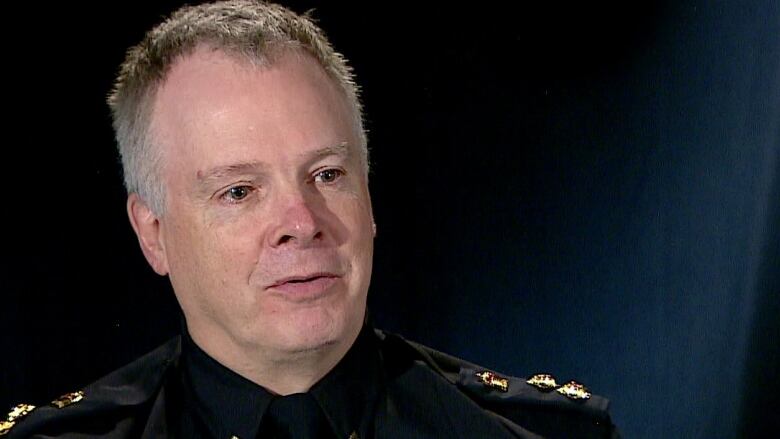Calgary police chief emphasizes his respect for journalists amid confidential-source crackdown
Relationship between Calgary police and local media 'envied by many agencies,' chief notes

Calgary police Chief Roger Chaffinissued a statement Friday saying he respects the news media and the role it plays in society,after it came to light that he is trying to root out officers whoact as confidential sources to reporters.
"There were a number of incidents over an extended period of time that prompted me to write the memo to our members,"Chaffin said, referring to a Februarynote warningofficers about leaking informationthat was described as "strongly worded" by the editor of the police union's magazine.
In the latest issuethe editor, Paul Wozney, backed the chief for taking a stand,saying "we have enough butt-holes in the media, the community, and on the defence-side of the bar taking shots at us" and adding that the service doesn't need its own members "taking shots at each other."
- MORE CALGARY NEWS |Murphy Oil makes 'significant' job cuts worldwide, including Calgary
- MORE CALGARY NEWS |Urban farming group 'slammed by demand' from charities amid economic downturn
Wozney's article focused largely on the confidential sources who revealed to CBC News that the officer involved in thefatal shooting ofDaveMcQueenin Januarywas also the one who fatally shot Anthony Heffernanin March 2015, despite not having been cleared of wrongdoing in the first shooting.
"Don't you think that the member you blabbed about, who responded to two extremely high risk calls and had to make split second decisions in the interests of their own personal safety and the safety of the community, has a right to feel safe with their own organization?" Wozney wrote.

And while the chief said the Heffernan case was included inwhat he described as his "quest" to find out who has been providing confidential information to the media, he emphasized in his statement that the "primary focus"is related to other incidents, including"leaked operational plans that could have put our members in jeopardy."
"As you know, information is sometimes withheld from the public as it is critical to the investigation," Chaffin said. "When it is leaked to anyone, it can have a significant impact on ongoing investigations."
Calgary Police Association president Howard Burns stood by Wozney's articlebut admitted the leak in the Heffernan case would not have compromised any ongoing investigation.
AnthonyHeffernan's brother Grant said the familyis "very thankful" to the confidential sourcesfor revealing the fact that the officer who killed Anthony was also involved in the January shooting.
Public interest
Sean Holman, a journalism professor at Mount Royal University, said the public should have a right to know virtually everything that's going on with the police, as long as it doesn't compromise an ongoing investigation.
He described the chief's position as "troubling."
"What, essentially, the Calgary police are doing is saying the public only has a right to information that they want the public to know about," Holman said.
"That's just not the way democracy works and that's just not the way a public institution works."
There is often a public interest and a public-safety interest in having reporters use confidential sources to reveal information that would otherwise remain secret, Holman added.
He noted that confidential information provided by police sources to a Vancouver Sun reporter helped push the Vancouver Police Department to finally investigate the numerous cases ofmissing women in the city's troubled Downtown Eastside.
"That information eventually led to the arrest of [serial killer]William Picktonand also shed light on foot-dragging by the Vancouver police," Holman said.
'Two-way street'
Chaffin said he recognizes the relationship between police and the news media is a "two-way street."
"We often need your help and we are hugely appreciative when you assist us in covering stories where we need public assistance to help solve a crime to keep our communities safe," the chief said.
"However, we have a duty of care for the information that is entrusted to us. We have legislation and due process we have to follow as an organization, and I cannot risk that being breached by individual members who bypass the appropriate procedures to release information."
The chief said thestrong workingrelationship between police and journalists in Calgary is "envied by many agencies" across Canada, adding thathehas a "huge amount of respect for the media."
"I also want to make it clear that the memo was directed to members of CPS," he said.
"We are not asking the media to do anything differently and we have not asked members to stop talking with the media."












_(720p).jpg)


 OFFICIAL HD MUSIC VIDEO.jpg)
.jpg)



























































































